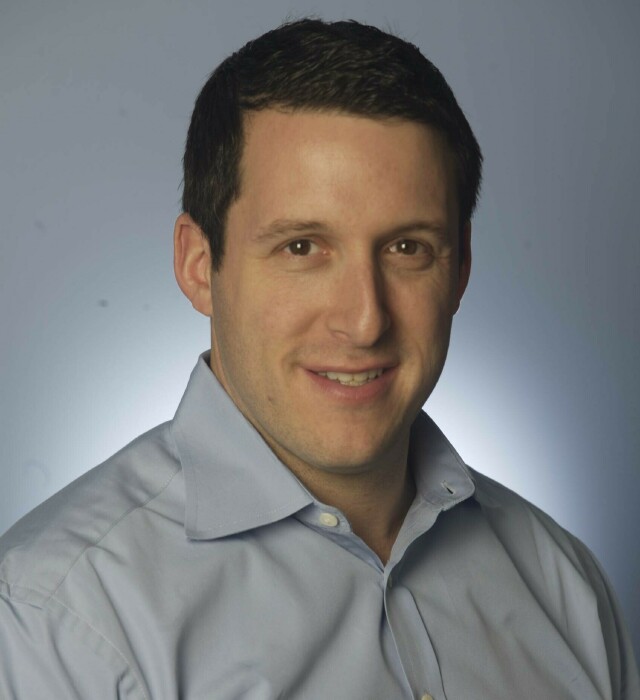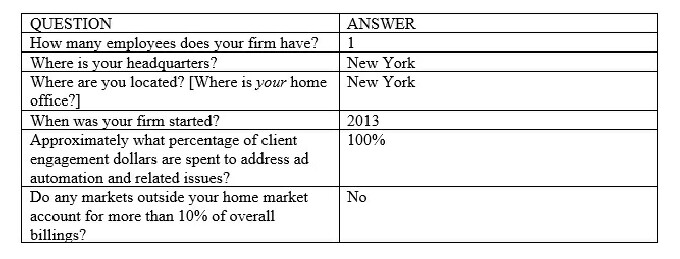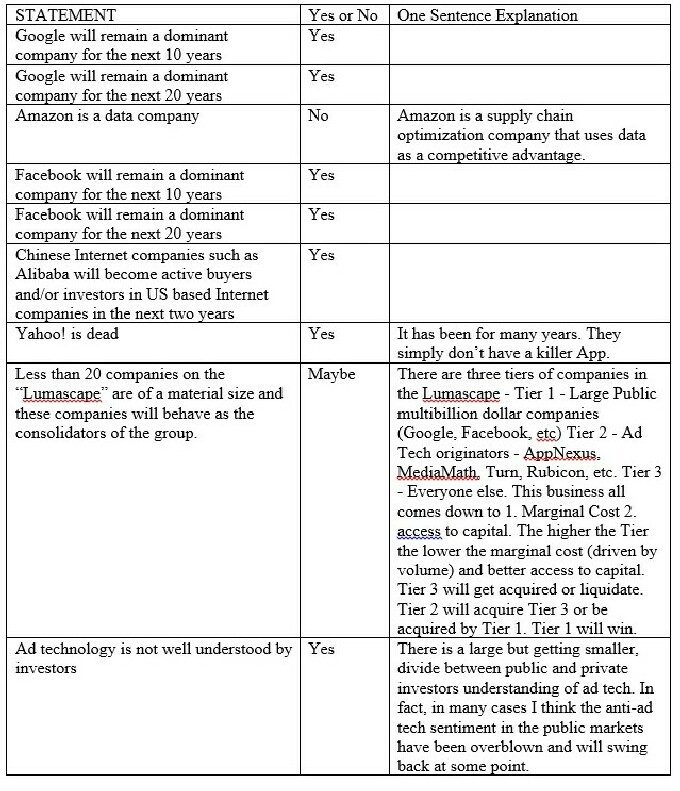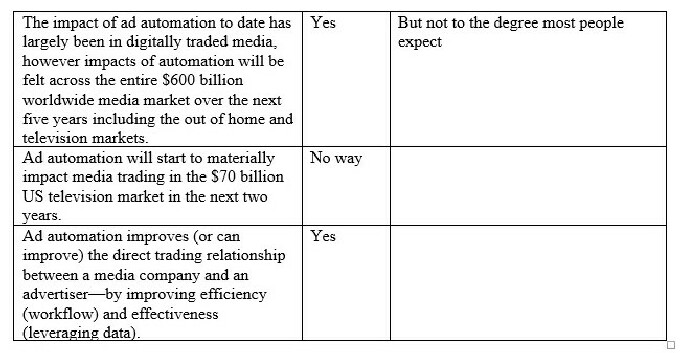Steven Golus of Steven Golus Consulting: The Ad Automation and Programmatic Confidantes

Continuing with his series of conversations with the leading confidants and consultants in the ad automation and programmatic area, Jay Sears, Senior Vice President Marketplace Development of Rubicon Project, discusses trends and issues of the day impacting advertisers and media owners. In this column, Sears speaks with Steven Golus of Steven Golus Consulting and a longtime ad technology executive with roles at DataXu and Google. (Be sure to read the first two columns in this series, in which Jay talks with Jon Mandel of Dogsled Enterprises and Eric Bader of Transparent Media Partners.)
Your Name:Steven Golus
Your Company:Steven Golus Consulting
SEARS: What do you read to keep up with politics, art and culture?
GOLUS: I’m a heavy RSS user. I use feedly to aggregate around 100 blogs/sites covering everything from news to gadgets to science and health to music and movies. I read The New York Times Online top articles once a day. Also, fivethirtyeight is a favorite.
SEARS: What do you read to keep up with friends?
GOLUS: I typically do a daily scan of Facebook and Instagram.
SEARS: What do you read to keep up with the advertising technology industry?
GOLUS: Other than a morning scan of AdExchanger headlines, I try not to spend too much time reading on the ad tech industry. Frankly, most of the news is recycled. Outside of some of the newer issues around fraud and ad blocking most of the key topics are the same ideas we’ve been discussing for years.
SEARS: What’s your favorite commercial of all time?
GOLUS: The AT&T You Will campaign from the early 90’s is my favorite. While most of the concepts felt like science fiction, they also felt within reach. Looking back, the campaign was incredibly accurate, although most of the activities presented can now be done from the palm of your hand.
SEARS: With regards to advertising automation, what are the three biggest trends you expect to impact companies in 2016?
GOLUS:
- Ad blocking
- Header bidding
- Fraud
SEARS: With regards to advertising automation, what are the three most overblown topics that you wish would just go away?
GOLUS:
- Ad blocking
- Header bidding
- Fraud
I think we are in a very interesting point in the history of our industry. If you take a look at my answers above, you can see that we are in a time where most of what we are discussing is doom and gloom. This is a big 180 from a few years ago. Ironically, on the margin, this sentiment benefits Google and Facebook more than the average ad tech company.
SEARS: Describe your firm and then tell us the three most common issues you help clients on with respect to advertising automation and programmatic trading.
GOLUS: I run a consulting practice focused on helping companies scale their Sales Strategy and Operations. This means helping sales organizations with their Go to Market Strategy, Market Segmentation and Focus, Sales Structure, Hiring Process, Onboarding and Training, Sales Compensation, CRM, KPI tracking and Process. There are about 10 best practices across these areas which in my opinion, will separate the winners from the losers in this space.

SEARS: What are the most common issues you help clients with regarding automation?
GOLUS: This is really about how to build a Go-to-Market Strategy around selling automation.
- Determining Strategy. You’d be surprised how many companies get this incorrect. When I start my work with a client, most are focused on solving the wrong problem in the market. Most have an incredibly high cost of sale with no rate of return so we need to address their product set, the product market fit and where they can get the best ROI.
- Hiring and Onboarding Sales Talent. Another area where most companies in this space struggle. I’ve walked into about a dozen ad tech companies that have hired the wrong people given where they need to focus their efforts. Most have not performed any level of sales training and enablement and are setting themselves and their employees up for failure. My advice? Take a month to properly train sellers. After the month you will be able to determine if they are a long term fit for the company. If they are not, you should part ways. It’s best for all parties.
- Teaching resourcefulness. Garden variety sales teams who do the basic blocking and tackling will not be successful. Sellers need to be or taught to be resourceful and to be creative problem solvers.
SEARS: The majority of ad technology companies have struggled (relatively small, unprofitable or both). Of the poor performers, what are the commonalities between them that have contributed to this weakness?
GOLUS:Most companies in this space have incredibly high expectations and lofty sales goals operating in a highly commoditized market. Many have convinced themselves they have built something unique. Fact is that they have not but they still expect sales to grow at a rapid clip. High sales expectations in a highly competitive sales talent market typically means hiring a sub-par sales team with sub-par training and operations. Ultimately these sales reps get let go or leave at the 12 to 18-month mark for a host of reasons. Then these sellers go to another ad tech company and it becomes a vicious cycle making the weaker companies even weaker. Tip: Analyze your sales team; look at the commonalities of the successful sellers (athletic? high IQs? Coachable?) and develop a hiring process to find more sellers like them. It’s like look-a-like modeling for talent.
SEARS: A smaller handful of ad technology companies has achieved scale and performed better than the rest. What are the commonalities between them that have contributed to this relative strength?
GOLUS:It really comes down to timing. If you launched your ad tech business between 2006-09 and were able to achieve scale (150+ employees, 75MM+ in spend) before 2011-12, chances are you are a market leader (AppNexus, Rubicon, MediaMath), or have been acquired for a nice multiple (LiveRail, BlueKai, Admeld). There is an incredible reward given to those who were smart enough and risky enough -- we were in a major economic downturn in 2008 -- to launch their business back then.
SEARS: Do we live in a “tale of two cities” where Google and Facebook win almost everything, advertisers are dictated to and other media companies fight for the scraps?
GOLUS:I believe so. It comes down to access to capital and proprietary data at this point. That said I think Netflix and Amazon are two companies that, with business model tweaks and focus can take billions of dollars in ad budget over the next few years.
SEARS: Please answer the following statements yes or no.
GOLUS:


SEARS: If you could go to the airport right now with friends or family and fly anywhere in the world for vacation, who would you take and where would you go?
GOLUS:Assuming safe travel and safe return, North Korea. To me it would be the closest I can get to traveling in time or to an alternate universe. I think it would be an incredibly eye opening experience for my family and me.
SEARS: If you could create an endowment to fund any existing non-profit you designated, what lucky non-profit organization would that be?
GOLUS: I am passionate about health and wellness. Specifically, I believe the present value of the investment in health and wellness awareness during an individual's early years will pay dividends to future generations. I would most likely start my own non-profit rather than endow it to another.
SEARS: What is your favorite restaurant in the world?
GOLUS:Right now it’s John Brown Smokehouse in Long Island City.
SEARS: Thanks, Steven!
Do you know a leading ad automation consultant in the ad automation and programmatic area advising advertisers and media companies that Sears should consider interviewing? Tell him.
The opinions and points of view expressed in this commentary are exclusively the views of the author and do not necessarily represent the views of MediaVillage.com/MyersBizNet management or associated bloggers.


